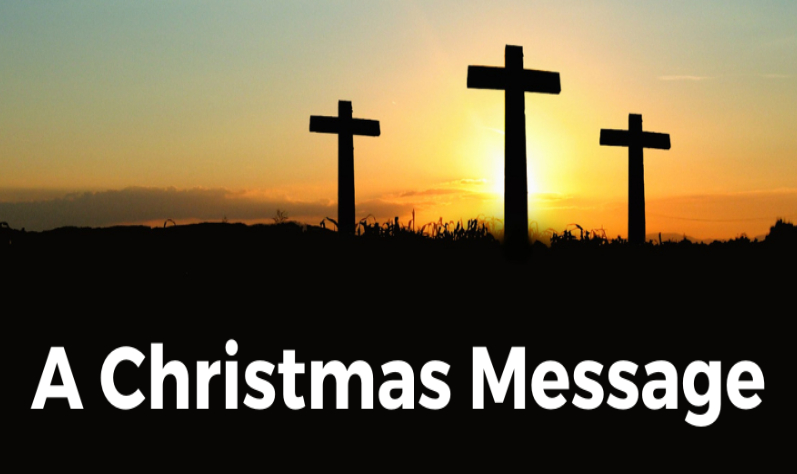It’s almost Christmas! A very special time in the life of the Christian Church as we celebrate the birth of our Lord Jesus. A time when we are reminded that God sent his Son to save us.
“The Word became flesh and made his dwelling among us. We have seen his glory, the glory of the one and only Son, who came from the Father, full of grace and truth” (John 1:14).
Christmas and human dignity.
The Incarnation declares that the divine Jesus is truly human. Stop! Please think about that for a moment. Jesus is fully human (Hebrews 2)! This truth gives us as humans a deep and solid sense of dignity. All humans, black and white, male and female, rich and poor are not only created in God’s image but we share this humanness with Jesus Himself. Wow! May God help us to treat each other with dignity, courtesy, respect and love.
Christmas and salvation.
He is our Saviour. The Son who came from the Father’s side at the Father’s will to become the sinner’s substitute on the cross (Matthew 20:28; 26:36-46; John 1:29; 3:13-17; Romans 5:8; 8:32; 2 Corinthians 5:19-21; 8:9; Philippians 2:5-8). Indeed, during the Christmas season we sing and celebrate the birth of our Saviour. Hallelujah! In Christ, our sin is forgiven… forever!
“Salvation is found in no one else, for there is no other name under heaven given to mankind by which we must be saved” (Acts 4:12).
Christmas and doctrine.
A crucial event for the church’s confession of the doctrine of the Incarnation came at the Council of Chalcedon (AD 451). The council affirmed that Jesus is one divine-human person in two natures, that the two natures are united and that each nature retained its own attributes. And we see this grand truth so clearly in the four New Testament Gospels.
The Incarnation, this mysterious miracle at the heart of historic Christianity, is central in the New Testament witness. That first century Jews schooled in the Old Testament should ever have come to such a belief is astounding. Eight of the nine New Testament writers, like Jesus’ original disciples, were Jews, drilled in the Jewish belief that there is only one God and that no human is divine. They all teach, however, that Jesus is God’s Messiah, the Spirit-anointed son of David promised in the Old Testament (Isaiah 11.1-5). And they all present him in a threefold role as teacher, sin-bearer and ruler.
Christmas and Jesus.
Let’s think about this for a moment:
- Teacher. Jesus is the prophet of God (Deuteronomy 18:15; cf. Mark 9:7). We should listen to him as he speaks to us by his Spirit through his written word we call the Bible. We must not only listen, we must obey.
- Sin-bearer. Jesus is our priest. He offered himself on the cross as our substitutionary sacrifice. He paid for our sins so that if we believe in him, we do not have to pay for them ourselves. What a gospel! What good news!
- Ruler. Christ is ascended and seated on the throne at the Father’s right hand. He is our King. We should live before him in awe and wonder and fear and joy and trust and love, all wrapped up in our daily discipleship. All the New Testament writers insist that Jesus the Messiah should be personally worshiped and trusted, day by day. His kingdom (the Kingdom of God) has been inaugurated.
This has huge implications for justice and righteousness and for the church being active in our broken world – at all levels, including politics, economics and social issues. In Christ, the kingdom of God has been inaugurated and we must live accordingly in our South African context, fighting against racism, the negative legacies of colonialism and apartheid, poverty, GBV, child abuse, human trafficking, and indeed against all unrighteousness and injustice.
Why?
Because we are disciples of Christ and he is our King, and he is the King of the whole world, and his kingdom has been inaugurated. We are committed to doing his will – in our personal lives, in our families, in our businesses, in our churches and in our country. We are his witnesses in this our broken world, and we live under his Lordship.
Christmas and worship.
The New Testament commands the worship of Jesus and focuses consistently on the divine-human Saviour and Lord as the proper and only object of faith, hope and love.
- Is he the object of your faith? Faith is no big deal – we all have faith in all sorts of people and things. But is your faith in Christ and in Christ alone? The Christ of the Bible? There is no other mediator between God and us sinners (see 1 Timothy 2:5; Hebrews 8:6; 9:15; 12:24).
- Is he the object of your hope? Hope is basic to the Christian outlook. As Christians living between the two comings of our Lord Jesus we look back to the manger, the cross, and the empty tomb where salvation was won for us; and forward to our meeting with Christ, our resurrection body, the new heaven and the new earth. New Testament devotion is consistently oriented to this hope; Christ is “our hope” (1 Timothy 1:1) and we serve “the God of hope” (Romans 15:13). Do you?
- Is he the object of your love? Believing in and being enveloped by his divine love generates and sustains the love to God and neighbour that Christ’s two great commandments require (Matthew 22:35-40). Loving is basic to Christian behaviour (1 Corinthians 13:4-7). We who are disciples of the Lord Christ must set the example in sacrificial love which involves giving, spending, and impoverishing ourselves up to the limit for the well-being of others, especially in the church, and especially across the race, culture, language, gender, economic, disability and age divide. Neighbour-love seeks the neighbours good, and the true measure of it is how much it gives to that end.
Any understanding and celebration of Christmas that lacks these emphases is not Christian. May our gracious and glorious God grant you a Christ-filled Christmas!
Ross Anderson
Advent Sunday 2020
Bibliography
Berkhof, Louis. 1976. Systematic Theology. Edinburgh: Banner.
Hodge, Charles. 1979. Systematic Theology in Three Volumes (Volume II). Grand Rapids: Eerdmans.
Packer, J.I. 1993. Concise Theology. A guide to historic Christian beliefs. Wheaton: Tyndale.
Packer, J.I. 1993. Knowing God. Second edition with study guide. London: Hodder & Stoughton.


